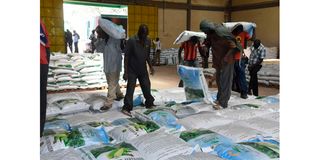Munya: Only registered farmers to get subsidised fertiliser

Workers offload fertiliser from a truck to a godown at the National Cereals and Produce Board, (NCPB) Eldoret Depot in Uasin Gishu County during the launch of the government subsidised fertiliser by Agricultural Cabinet Secretary Peter Munya on Monday April 04, 2022.
Only farmers who have been vetted and registered will receive subsidised fertiliser, in a move aimed at ridding the market of cartels, Agriculture Cabinet Secretary Peter Munya has said.
The CS said on Monday the ministry will ensure that only genuine farmers, registered and verified by county agriculture officials and the county commissioner’s office through local chiefs, will get the fertiliser.
“The old data is already there and new ones are required to go through the same process. The data will show us the farm acreage and other personal details like national identification number and mobile phone number so that it allows us to do random-checking to ensure that the data is not cooked,” he said.
Farmers across the country will now access up to 20 bags of subsidised fertiliser after the Ministry of Agriculture raised the cap from 10 bags following an outcry from large-scale farmers.

Agriculture Cabinet Secretary Peter Munya (left), addresses farmers during the launch of government subsidised fertiliser at the National Cereals and Produce Board (NCPB), Eldoret Depot in Uasin Gishu County on Monday April 04, 2022.
The CS visited National Cereals and Produce Board (NCPB) stores in Trans Nzoia and Uasin Gishu counties on Monday. He announced the increase in bags and noted that it will allow large-scale farmers to get the commodity ahead of the long rains.
“We have increased the number of bags to address the needs of those with large farms. We are saying even those who have higher acreage, so long as you come and you are registered, you will now access 20 bags of fertiliser,” he said when he met farmers at NCPB stores in Eldoret with NCPB Managing Director Joseph Kimote and Kenya Seed MD Fred Oloibe.
The CS announced on Friday that farmers will pay Sh2,800 for a 50kg DAP fertiliser, down from Sh6,400 after a meeting at State House.
With the government subsidy, a 50kg bag of NPK fertiliser will cost Sh3,000; MOP (Sh2,500), CAN (Sh1,950), UREA (Sh2,700) and Sulphate of Ammonia (Sh2,500).
The ministry had initially said each farmer would only access up to 10 bags.
As of Monday, data from the ministry showed that at Moi Bridge stores, 1,060 bags of the DAP fertiliser had been sold, and in Kitale 1,080 of Mavuno, 560 of NPK and 560 of OCP.
Trans Nzoia is expected to plant 1,005 hectares and requires 450,000 bags of fertiliser for planting and about 600,000 for top dressing.
At the Eldoret store, 2,480 bags of DAP, 294 of Mavuno and 560 Nafaka had been sold by Monday.
The subsided fertiliser prices were enabled by Sh5.73 billion set aside by the government to subsidise 2,280,000 bags of 50kg for farmers growing food crops. It followed a public outcry over high fertiliser prices.
These quantities are expected to support the cultivation of 1.13 million acres.
Mr Munya said farmers had started getting the fertiliser from Saturday at all NCPB depots.
A farmer requires a 50kg bag to plant an acre and the same quantity for top dressing, implying that five bags will only be enough for five acres.
“The uptake is now picking and we are also seeing more farmers are also buying the certified seeds. Initially, they were slower in buying the seeds but now they are coming back,” said the CS.
Meanwhile, Mr Munya called on Kenyans, particularly farmers, to partner with State agencies and share information that could help weed out unscrupulous traders who might seek to benefit from the subsidy programme.
He said the NCPB has internal mechanisms to show that actual fertiliser has been sold against the actual acreage owned by each farmer.
Global prices for fertiliser started rising at the beginning of 2021 due to the impact of Covid-19 and worsened when Russia invaded Ukraine.
Farmers in the North Rift region yesterday welcomed the subsidised fertiliser even as they urged the government to intervene and lower the cost of fuel.
“We appreciate the move by the government to lower fertiliser costs but it should also review fuel prices,” said Thomas Bowen.






